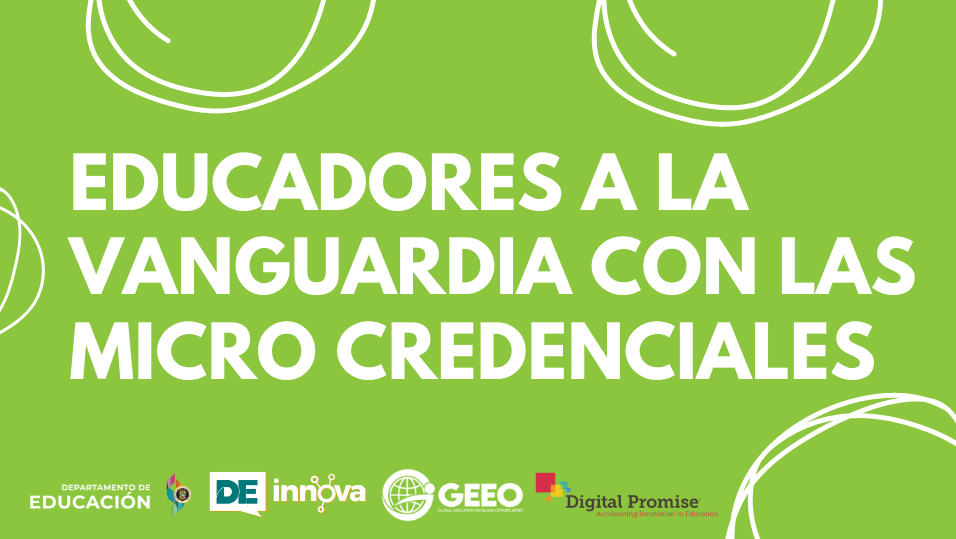Educators at the Forefront with Micro Credentials
The education scenario for the 2020-2021 academic year was an unusual one, marked by new challenges and big lessons. By way of an emergency, face-to-face education was replaced by inescapable remote education. Educators abruptly had to adopt new teaching methodologies. For those who had no previous experience of distance education, this experience was undoubtedly a great lesson. It may seem simple, but we must consider that a change in educational methodology is a complex process that involves multiple functions. So, our educators were not only teaching, they were also learning. However, given the implementation of new educational methodologies our educators have had the opportunity to develop and demonstrate new skills.
During this academic year, all teachers in the Puerto Rican public education system had access to a comprehensive, flexible and personalised professional development programme, through which they acquired and strengthened competencies in the use and integration of technology to carry out the teaching and learning process. This initiative aims to foster a new techno-pedagogical culture in school settings. The Puerto Rico Department of Education (PRDE) worked in partnership with Global Education Exchange Opportunities, Inc. (GEEO), an innovative Puerto Rican company led by Dr. Odette Piñeiro Caballero, dedicated to identifying and developing the best educational and management practices worldwide, to develop and implement an innovative self-directed learning ecosystem as part of the agency's professional development model. GEEO, in turn, collaborated with Digital Promise Global, an organisation based in Washington, D.C. and California whose mission is to accelerate innovation in education to improve learning opportunities, in the development of 22 micro competency-based credentials. Through the DE-Innova project, these micro-credentials are available free of charge to all teaching and non-teaching staff in the public education system on the GEEO website: https://www.geeopr.com/. Overall, the 22 micro-credentials available are aimed at developing or strengthening competencies related to the use and integration of technology in the classroom. This partnership has laid the foundation for the transformation of teaching and learning processes in professional development environments on our island. In this way, the traditional professional development system is being set aside in favour of inserting a new modality of self-directed learning in tune with today's social reality.
Learning does not stop at university. Professionals need to keep learning continuously, inside or outside the educational context. Now more than ever, lifelong learning is a requirement to ensure effectiveness and efficiency in the professional environment. Micro-credentials are positioning themselves as a trend in the field of professional development; [...] they not only promote competitiveness in the workforce quickly and effectively, but at the same time adapt to the demands of the professional's job and family (Wheelahan, 2021). According to a study conducted by Berry & Byrd (2019) in the United States, micro-credentials serve as a powerful tool for improving the professional development industry by serving teachers and administrators. Micro-credentials not only focus on content but also incorporate active learning, an important feature for professional development. This professional learning ecosystem encourages teachers to direct their own learning, gather evidence of impact, and publicly demonstrate what they have accomplished.
Faced with this new normal, and implementing this new modality (at their own pace and according to their areas of interest and opportunity), 311 educators already have at least one digital badge. The following graph shows the distribution of digital badges acquired by Regional Education Office.
Through earning the digital badge, educators demonstrate their competencies in rigorous, research-supported content and receive recognition for their skills. As of 30 June 2021, Global Education Exchange Opportunities and Digital Promise Global have awarded a total of 375 digital badges. Among the micro-credentials most requested by educators are Why Use Technology in the Classroom, Empowering Parents through Technology, Creating Digital Citizens, Using Technology as a Professional Learning Tool and Behaviour Management in a Digital Classroom.
 This innovative modality will remain available free of charge for educators in the public system until 26 August 2021. GEEO invites you to its Virtual Education Support Room every Wednesday and Thursday at 1:00 p.m., where you will have live support from experts in the application process and content of the micro-credentials, and where you will have the opportunity to clarify doubts and concerns.
This innovative modality will remain available free of charge for educators in the public system until 26 August 2021. GEEO invites you to its Virtual Education Support Room every Wednesday and Thursday at 1:00 p.m., where you will have live support from experts in the application process and content of the micro-credentials, and where you will have the opportunity to clarify doubts and concerns.
For more information about micro-credentials, go to: https://www.geeopr.com/de-innova/#credencialesporcompetencia.
.
.
.
References
Berry, B., & Byrd, A. (2019). Micro-credentials and education policy in the United States. Recognizing learning and leadership for our nation's teachers. Digital Promise. https://digitalpromise.org/wp-content/uploads/2019/06/mcs-educationpolicy.pdf
Wheelahan, L. &. (2021). Analyzing micro-credentials in higher education: A bernsteinian analysis. Journal of Curriculum Studies, 212-228. doi: http://dx.doi.org/10.1080/00220272.2021.1887358
This article was written by Dr. Judith Santos and Dr. Karla C. Colón.



